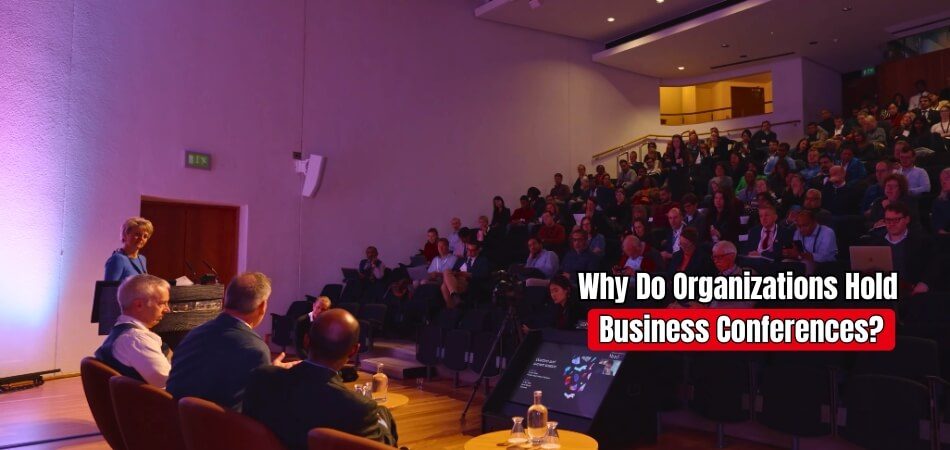The challenge of staying ahead in today’s competitive business environment requires more than just sound strategies. It requires continuous engagement with industry trends and networking opportunities. These engagements are made possible through business conferences.
Trusted organizations host the events and provide a unique forum to discuss emerging industry challenges and innovations and develop personal and professional skills. But why do organizations hold business conferences?
They do so to establish and develop their brand presence, create valuable professional networks, spark innovative ideas, and showcase thought leadership. Also, they address common industry challenges, attract potential investments, and uncover new startup opportunities.
Learn more about these benefits and explore how business conferences can transform challenges into opportunities for growth and development.
What a Business Conference is All About?
There’s nothing like a business conference to bring industry leaders and professionals together. The events are designed to promote networking, collaboration, and ideas exchange. Participants have the unique opportunity to gain insights from peers and industry experts, which can significantly propel their business forward.
One of the core benefits of these conferences is the expansion of skills and knowledge by engaging in international business conferences. For example, attending a business conference Canada can broaden one’s knowledge and introduce various methods and technologies relevant to one’s field. Exposure to global practices improves problem-solving capabilities and encourages innovation.
Business conferences are charged with energy and potential. Here, strategic partnerships are often formed, and future trends are predicted. Each participant leaves equipped with tools and concepts immediately applicable to their professional environments, ensuring ongoing growth and development.
Holding a Business Conference: What Does it Mean?
Holding a business conference involves considerable planning and organization. It creates a space for professionals to share insights and build collaboration. This process is necessary for sparking innovation and building networks.
In managing such a conference, one aims to deliver impactful knowledge through speakers and discussions. It’s an opportunity to engage with peers and industry leaders and gain fresh perspectives. The experience benefits attendees, offering them tools for professional advancement.
A well-executed conference can have profound effects after the event. Participants depart with more advanced skills and new business connections. These outcomes make holding a business conference a valuable investment for any organization.
Why Do Organizations Hold Business Conferences?
Organizers host business conferences to boost their industry standing. These events provide a platform for collaboration, idea exchange, and innovation. Below is a detailed explanation of why do organizations hold business conferences.
Facilitating Knowledge Exchange and Industry Insights
One of the primary reasons organizations hold business conferences is to facilitate the exchange of knowledge and insights. Conferences bring together industry leaders, experts, and professionals who share their expertise on relevant topics, trends, and innovations. By organizing educational workshops, keynote presentations, and panel discussions, businesses ensure that attendees leave with valuable information they can apply to their own work.
For organizations, these knowledge-sharing opportunities are critical in staying ahead of the competition. It’s also one of the key elements of a successful business conference, ensuring that participants walk away with actionable insights and new perspectives.
Building Strategic Networking Opportunities
Business conferences offer excellent networking opportunities. Whether it’s an industry-specific event or a broader conference, attendees can connect with potential partners, clients, and even competitors. For organizations, this is an essential reason to host or participate in conferences—they allow for relationship-building that could lead to collaborations, partnerships, or business deals.
Networking isn’t just limited to external connections. Companies often use conferences to strengthen relationships between different departments or regions within their own organization. By bringing together employees, partners, and clients in one space, companies foster meaningful conversations and lasting relationships.
Showcasing Brand Identity and Strengthening Market Presence
Conferences are a great platform for organizations to showcase their brand, products, and services. Whether through speaking engagements, sponsorships, or exhibiting products, businesses use these events to build brand recognition and establish themselves as leaders in their industry.
For many organizations, holding or sponsoring a business conference elevates their visibility and reputation. Being associated with high-quality, well-attended events not only demonstrates credibility but also enhances their market presence. Exhibiting products or services at conferences allows organizations to directly engage with their target audience, answering questions and providing demonstrations in real time.
Driving Business Growth Through Lead Generation
Business development is another key reason why organizations hold conferences. Conferences provide a space for companies to generate leads and identify new business opportunities. Whether they’re promoting products, demonstrating services, or presenting case studies, conferences offer a direct path to attracting new clients and partners.
Lead generation at conferences is often highly targeted. Because attendees are already interested in the industry or field, they are more likely to engage with businesses that offer solutions to their problems or needs.
Enhancing Internal Team Collaboration and Alignment
In addition to external benefits, business conferences also play an important role in internal alignment. Organizations hold internal conferences or retreats to bring together employees from different departments, regions, or branches. These events are a great way to promote teamwork, share company-wide goals, and ensure that everyone is aligned with the organization’s strategic vision.
Internal business conferences often include team-building exercises, leadership workshops, and strategy sessions. These events not only motivate employees but also help them develop the skills and knowledge needed to work more effectively as a team.
Promoting Corporate Social Responsibility and Ethical Practices
Many organizations hold conferences to promote their commitment to corporate social responsibility (CSR) and ethical business practices. These events provide a platform for discussing important social, environmental, and ethical issues within an industry. For organizations, this is a chance to demonstrate leadership and dedication to sustainability, diversity, and responsible business practices.
Launching New Products or Services
Business conferences are an ideal platform for launching new products or services. Organizations use conferences to generate buzz around their new offerings, showcasing them to a targeted audience of industry professionals, clients, and potential customers.
The live demonstrations and in-depth presentations during these events allow businesses to highlight their product’s unique features and benefits.
Gathering Market Feedback
Organizations often use business conferences as a way to collect real-time feedback from potential customers, partners, and industry peers. This helps them gauge interest in new products, services, or business strategies. Engaging directly with the target audience provides valuable insights that can be used to refine or adjust offerings before a full-scale launch.
Fostering Innovation and Creativity
By bringing together diverse minds from across industries, conferences foster an environment of innovation and creativity. Organizations host conferences to inspire fresh ideas, creative problem-solving, and brainstorming for new projects or improvements. Attendees often leave with new perspectives that benefit both the individual and the company.
Strengthening Community and Industry Connections
Conferences are also a way for organizations to strengthen their ties to their broader industry or community. Whether it’s connecting with other businesses, professional associations, or local governments, these events help build a sense of community.
Organizations may host or sponsor conferences to play a more active role in industry development, contributing to growth and collective progress.
Organizations hold business conferences for several compelling reasons, from facilitating knowledge sharing to driving business growth and promoting ethical practices. These events are invaluable in building relationships, enhancing brand presence, and aligning internal teams. Whether aimed at industry peers or internal employees, business conferences serve as powerful tools for organizations to achieve strategic goals and thrive in a competitive market.
What is the Role of Organization in Holding Business Conference?
The process of organizing a business conference requires careful planning and execution. Organizations take on various roles to make sure these events are successful and beneficial.
Their involvement is essential in setting the stage for meaningful exchanges and networking opportunities. below are the roles of organizations in holding business conferences:
Planning and Coordination
Organizations carefully plan every detail of the conference. They select suitable dates and convenient locations for all participants. Teams focus on effective planning for business conference success by aligning the agenda with the event’s goals. Effective coordination sets the foundation for a seamless event.
Setting the Agenda
The agenda is essential for guiding conference flow and focus. Organizations curate topics that align with current industry trends. Speakers and panelists are chosen for their expertise and influence. This careful selection assures that discussions are engaging and insightful.
Logistics Management
Handling logistics is a fundamental role of the organizing body. They manage venue arrangements, technology setups, and catering services. Proper logistics support smooth operations throughout the event. A well-managed event greatly enhances the experience of attendees.
Marketing and Promotion
Effective promotion is key to attracting the right attendees. Organizations use various platforms to announce and market the conference. Targeted outreach gathers a diverse group of professionals. This strategy provides a dynamic mix of participants for richer interactions.
Networking and Growth Opportunities
Creating networking opportunities is a primary goal for any business conference. Organizations plan sessions and activities that encourage interaction. These planned interactions promote professional relationships and collaborations. Organizations planned to make successful business conferences that expand professional networks and personal growth.
Tips to Attract More Attendees at Business Conference
Marketing and strategic planning are essential to attracting attendees to a business conference. Organizations can attract a larger, more engaged audience by focusing on key elements. The following tips will help you make your event a success:
- Engage Influential Speakers: Invite well-known industry experts to speak at the event. Their presence can significantly boost interest and attendance.
- Offer Early Bird Discounts: Provide special pricing for those who register early. This motivates prompt sign-ups and indicates initial interest.
- Leverage Social Media: Promote the conference across various social media platforms. Use targeted ads and engaging content to reach a wider audience.
- Create Networking Opportunities: Highlight the chance to connect with industry leaders. Networking sessions can be a strong draw for potential attendees.
- Provide Valuable Content: Be sure the conference agenda includes relevant and timely topics. High-quality content is a major attraction for professionals.
- Utilize Email Marketing: Send personalized invitations and updates to your email list. Communication keeps potential attendees informed and engaged.
Frequently Asked Questions
Listed below are some FAQs and relevant answers that explain why do organizations hold business conferences:
Are Conferences Beneficial for Startups and Small Businesses?
Absolutely, conferences provide startups and small businesses with exposure, networking opportunities, and access to valuable resources, aiding in their growth and success.
Why Do Organizations Focus on Creating High-Quality Content for Conferences?
Relevant and timely topics attract a larger audience. High-quality content ensures that attendees find value in participating and engaging with the event.
Can Business Conferences Improve Employee Skills?
Yes, conferences provide training sessions and workshops that help employees develop new skills and enhance existing ones.
Are Virtual Conferences as Effective as in-Person Ones?
While virtual conferences offer convenience, in-person events provide opportunities for deeper networking and engagement.
What Are the 4 P’s of Meetings?
The 4 P’s of meetings are Purpose, Participants, Process, and Productivity. They ensure meetings are effective and impactful.
Are Conferences only for Large Corporations?
No, conferences cater to organizations of all sizes, offering opportunities for networking, learning, and brand establishment.
Bottom Line
Business conferences serve as powerful tools for organizations to connect, grow, and innovate. They offer unique opportunities to exchange knowledge, build valuable relationships, and strengthen brand presence.
Knowing why do organizations hold business conferences helps highlight their role in driving business development, attracting new clients, and fostering collaboration within and outside the industry. These events are more than just gatherings; they are catalysts for meaningful change.
By hosting conferences, organizations not only elevate their status as industry leaders but also create a space where growth, learning, and networking thrive—ultimately pushing their businesses forward.








